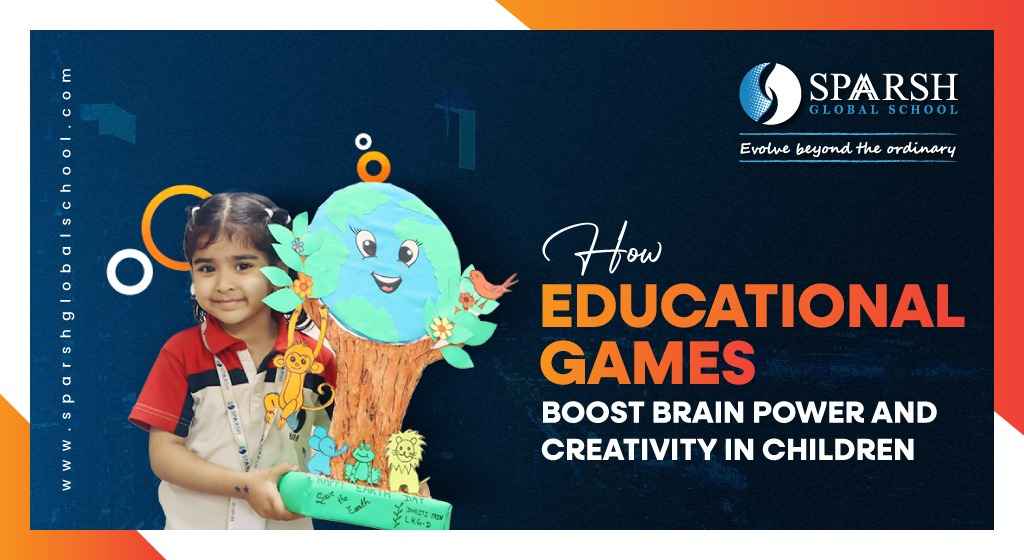Children are deeply engaged in technology and screen time in the current fast-moving digital environment. Excessive screen time poses risks, but when used constructively, digital tools can generate substantial learning benefits. Educational games are the most influential digital tools for teaching young learners effectively. These games represent more than their role as entertaining activities. These digital tools operate as influential instruments that boost cognitive processes and inspire creative development in young students.

Cognitive Development Through Play
Children develop cognitive skills through brain activation when playing educational games that exceed the potential of traditional academic approaches. The games require players to solve problems and remember things while spotting patterns and completing logical challenges. Games that require strategy and puzzles train children to reason critically and predict results, thus fostering their analytical abilities.
The combination of educational elements in gaming activities drives students to apply their classroom subjects to innovative problem-solving challenges. Educational games reinforce learning material through repetition, while offering rewards and prevent learners from feeling stress commonly associated with traditional assessment situations. The reinforcement strengthens both memory retention and enhances recall ability in children to access information effectively.
Games that force players to make instant decisions or construct word-building or number-based challenges help children develop faster mental reaction times. The intellectual improvements from gaming produce two types of benefits: academic success and the practice of daily problem solving.
Enhancing Creativity and Imagination
The contemporary world depends on creativity because it enhances innovation, emotional intelligence and resilience. Games with open-ended exploration, character-building and storytelling components give children the chance to freely use their imagination while playing. Through digital art platforms, students can join design simulations and coding adventures, which allow them to try out different ideas before creating personalised expressions.
Through role-playing games, children develop the ability to embody new personalities and craft their original fictional realms. Through these experiences, children develop better empathy while building their vocabulary and improving their storytelling abilities. Children discover better engagement when they join interactive learning structures that tailor their educational progression according to individual speeds and preferences.
Games that emphasise creativity inspire students to work together with their peers. By working together to brainstorm ideas and design solutions or build virtual structures, children develop teamwork skills and communication abilities that build emotional and social intelligence.
Motivation and Emotional Benefits
Educational games serve as one of the most influential features because they inspire students to learn. Educational games deliver instant feedback alongside rewards and achievement that motivate learners to persist despite failures. Success achieved develops both self-esteem and resilience.
Psychologists refer to the flow state as the mental condition that occurs when children engage in skill-level appropriate games which become progressively more challenging. Such educational games bring students both enhanced knowledge retention alongside decreased anxiety, thus creating a better learning environment.
Educational games offer accessible content for children with various learning needs or disabilities, so they can engage with materials in inclusive and empowering ways.
Balancing Screen Time with Purpose
Educational games provide clear academic advantages, but parents and educators must strike the right balance. Children need guidance from parents along with educators to select mind-stimulating educational games appropriate to their age and aligned with their curriculum. Using digital games, reading activities and physical movement along with social engagement yields the most beneficial outcomes in children.
The integration of educational games into school learning represents a valuable contribution that schools can provide to their students. Technology tools like interactive whiteboards, tablets and smart learning platforms present multiple ways for teachers to create active and interesting lessons. By applying game-based learning, teachers can serve multiple learning approaches for every student as per each one’s needs.
Conclusion
Educational games in a child’s learning come with multiple advantages, including better memory retention and problem-solving skills, along with improved creative abilities and emotional progress. The games convert dull learning into an exciting hands-on process that children find truly rewarding.
The innovative learning methods at Sparsh Global School are a reason why parents choose this school. Traditional teaching methods combined with game-based education tools help the school develop students who are both academically proficient and curious and capable learners. Sparsh Global School operates under the principle that teaching students to use creative cognitive tools today enables them to succeed in the flourishing world of tomorrow.
FAQ
1. Are educational games suitable for all age groups of children?
Yes, educational games are designed to cater to various age groups and developmental stages. For younger children, games often focus on basic skills such as letter recognition, counting and simple problem-solving. As children grow older, more complex games involving critical thinking, creativity and subject-specific knowledge become appropriate. It’s important for parents and educators to select age-appropriate games that align with the child's learning level and interests.




